The best time to buy your next home might be during the fall. Purchasing a property in the fall doesn't follow conventional wisdom we know. But let's break it down.
Fewer buyers in the market mean less competition.
Most buyers with a specific timeline will have already purchased their homes by the end of the summer. Simple laws of supply and demand dictate that fewer buyers (lower demand) translate to lower prices. Sellers who didn't move their properties during the summer may be forced to lower their prices. Often, these reductions occur because the property was initially overpriced and sat on the market for more than 30 days with no offers at the asking price.
Summer months mean Inventory is low, and the "best" sellers with the "best" properties will list their homes in the spring and summer months at premium prices. Real estate season moves fast, and some houses sell almost immediately after hitting the market. Without school restrictions and inconvenient weather conditions, buyers often compete for the best property, wanting to be settled before fall begins and the holidays roll around. A bidding war can mean paying too much for a property simply because of the time of year.
When the leaves begin to fall, sellers begin to feel the tingle of anxiety. Buyers, on the other hand, can research property values, school systems, taxes and neighborhoods without the pressure of competing bidders.
As an added benefit to buying later in the year, improvements and upgrades may be cheaper in the fall.
Autumn is the best time to buy appliances and household equipment, according to Consumer Reports Magazine. Labor Day sales offer a plethora of household goods at slashed prices, including gas grills, patio furniture, and landscaping equipment. Additionally, suppliers unveil their newest models of major appliances in September and October. Last year's models will be deeply discounted to make room on the showroom floor, offering savvy shoppers the opportunity to upgrade kitchens and laundry rooms at reduced prices. One notable exception: Manufacturers unveil new refrigerators in the spring.
And don't forget about Black Friday sales, when many stores offer extra perks, including free installation, delivery and haul away your old appliances. Combine these savings with a credit card that gives you cashback on large purchases, and your bank account will thank you.
Sellers aren't the only ones motivated to lower prices.
As the temperature cools down, so does the market, meaning real estate agents have more time to focus on you and your needs. Inventory will increase, enabling realtors to show you more properties within your price range.
During the summer months, sellers busily improve their homes, keeping painters, plumbers, handymen, and landscapers busy. As the fall approaches and demand wanes, contractors are more inclined to lower their bids. They may also have more time to devote to the details of your project. Perhaps more importantly, mortgage lenders and title companies are no longer bogged down in summer sales and can respond more quickly and with fewer delays.
Weather-related issues will be more apparent in colder weather.
Regardless of where you live, fall and winter produce the harshest weather of the year. Rain and snow tend to bring out the worst in a property or an HVAC system. Your home inspector may catch leaks or other weather-related issues easily, giving you a chance to negotiate a remedy. Without facing winter head-on, you will have time to observe chilly drafts and winterize your home by adding insulation, sealing cracks, and servicing your water heater and furnace. These improvements will not only make you more comfortable; they will save you money.
Find a VA Loan
Our VA loan finder can match you with up to five rate quotes from different lenders. Check it out now!





